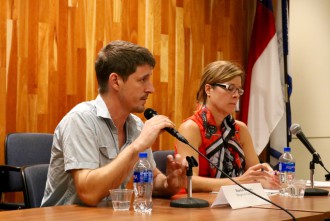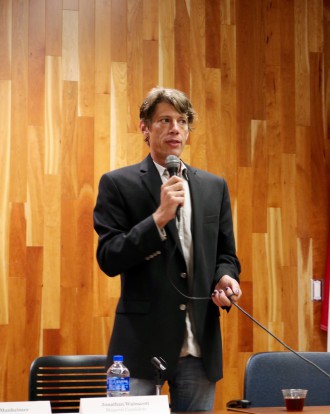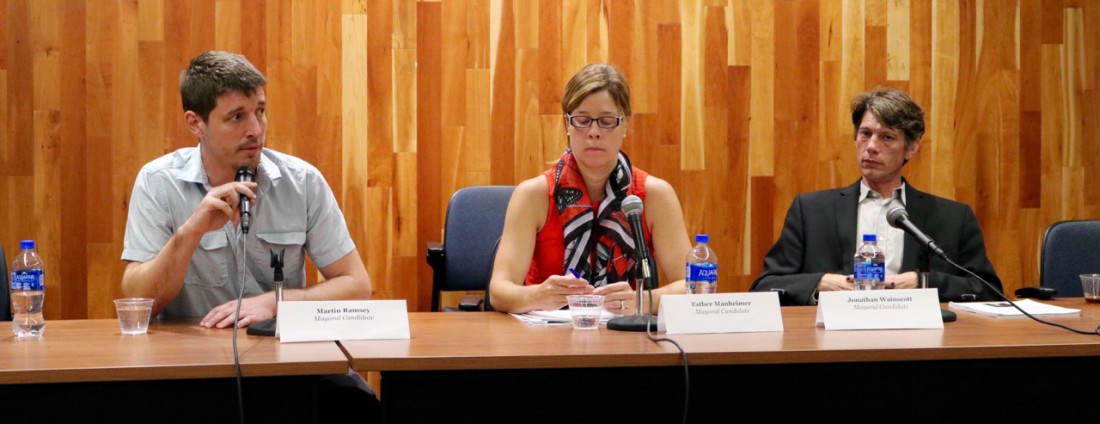The next mayor of the city of Asheville will be served a boiling stew of hot issues and will have to find a palatable way to nourish all its residents. That challenge steamed up at a candidate forum hosted by the Student Government Association and the Political Science Club at UNC Asheville on Sept. 18.
Incumbent and attorney Esther Manheimer, activist and waiter Martin Ramsey, and carpenter and artist Jonathan Wainscott spoke their minds on race, sustainability and affordability. A fourth candidate, Jonathan Austin Glover, will appear on the ballot but has withdrawn his candidacy. The Oct. 10 primary will whittle the three remaining candidates to two who will go before voters in the Nov. 7 general election.
A legacy of racism
UNCA Student Body President Tim Hussey asked the candidates how they would work to improve race relations in Asheville and what should happen to the Vance Monument amid a backdrop of escalating racial tensions nationwide.
Wainscott said he believes all three monuments in downtown that have ties to the Confederacy should be removed. “I think these monuments went up to send a message and I think they should be taken down to send a message,” he said.
At the same time, Wainscott doesn’t believe the city should spend money on removing them. He thinks a more pressing concern is an achievement gap between white and minority students in city schools. “I think that’s a very alarming paradox for a town that used to be so thoroughly liberal and progressive,” he said. “Other historically racist school districts in North Carolina are doing better than we are in that capacity.”
Manheimer said she feels very strongly that Confederate monuments need to be removed nationwide. “I see them as a result of institutional racism and a reminder of a time that we should not honor in our public places today,” she said.
Yet Manheimer believes Confederate names on statues and schools are merely emblematic of a more pernicious entwining of race and poverty. “When we talk about issues at the city, I really don’t care what we’re talking about, we are really talking about race. And that is true in so many Southern cities,” she said. “If we’re talking about transportation, if we’re talking about housing, if we’re even talking about zoning, if we’re talking about education — we are really talking about race and poverty in Asheville, because race and poverty are so aligned in our city.” She said the city has already taken steps to find solutions to these problems, such as the formation of a Human Relations Commission and the creation of an equity and inclusion manager staff position.
Ramsey pointed out that a 2015 North Carolina law prohibits removal of monuments by municipalities but said he would love to see a community demonstration take down the Vance Monument and challenge the state to do anything about it, without the city even having to get involved. But he also highlighted larger issues of race in the community, such as a disparity in the number of traffic stops between whites and minorities. “I think there are major challenges surrounding policing in terms of the number of stops that black and brown people can expect above and beyond what white people deal with on a daily basis,” he said. “That sort of perpetual attention from the police and incarceral state has resulted in a prison population that is highly unequal in terms of racial makeup across the country and is the biggest prison population in the history of mankind.”
Ramsey acknowledged that cities are limited in what they can do in addressing the racial makeup of incarcerated residents. “However, one thing that I think we should be advocating for is for a reduction in bail for crimes of poverty,” he said. “Race characterizes a large number of social justice and poverty issues that the city needs to deal with, and we need to take that seriously.”
How the mayor can save the planet
The moderator posed a question to the candidates on the premise that some residents of Asheville who want to engage in environmental sustainability are not physically able to do so. “How can the mayor be a leader in making environmental sustainability accessible to everyone?” Hussey asked. The question elicited a verdant garden of responses in many shades of green.

Ramsey said from his perspective as a socialist, it’s clear that our culture of consumption and throwaway goods is unsustainable. He posited that as cities along the nation’s coastlines become inundated with water from extreme weather events, they will see disinvestment in their real estate. “Millions and millions and millions of dollars in real estate along the North Carolina coast and Southern coast generally are going to be devalued, and we are going to see a lot of movement to interior cities,” he said.
That climate-driven migration will be felt in places like Asheville, Ramsey said. “So the idea that we’re going to remain a small, quaint city — ‘keep Asheville quaint’— is divorced from reality, and I think we need collective solutions surrounding health care and transportation, not individual, consumer-based solutions,” he said. “Caring for and remediating the natural environment is a task that is going to fall to my generation and my children, and there is one of two options, and that is destruction or revitalization through cooperative action.”
Manheimer said the city has implemented programs to lessen its environmental impacts, such as changing streetlights to LEDs, decreasing waste through a “big blue” recycling bins program, reducing the city’s carbon footprint and creating an Energy Innovation Task Force. “We now are trying to look at better ways to help engage citizens in participating in sustainability,” she said. “We realize that this is a community that prioritizes environmental issues above most other things.”
Manheimer hopes to win re-election so she can continue to fight on a state level against what she called “incredible erosion of environmental regulations that cities are allowed to impose locally.” “That’s everything from, can you clear-cut a lot? Can you take down all the trees? Can you put up billboards all over a city?” she said. “The legislature is systematically attacking us and taking away cities’ ability to control those kinds of things, and that’s a big deal.”
On the flip side, Wainscott said the money the city saved on programs such as more energy-efficient lightbulbs pales in comparison to its budget overruns on projects such as improvements to the River Arts District. “I think that we have been incredibly greenwashed in this town,” he said.
Wainscott said the city is borrowing money for infrastructure projects that are not environmentally friendly. “These sort of feel-good programs that we put out there in efforts to look like we’re going to save the planet from Asheville is just there to make you feel happy that something in that sort of recycling, eco world is happening, but it really isn’t happening in a practical sense, so I think we need to pay more attention to how our money is being spent to that end.”
High housing costs, low wages
As Asheville undergoes growing pains, city leaders must figure out how to balance the benefits of a burgeoning tourism scene with the needs of the workers who fuel that economy. “How do you see the city reconciling the booming growth of low-wage industries such as hotels and restaurants with the explosive growth of cost of living?” Hussey asked.
Manheimer said her family moved here in 1988 when the town was affordable and also largely boarded up, so the evolution of the city has been a mixed blessing. She laid out steps the city has undertaken to remedy the problem, such as paying all city employees a living wage. “The thinking around that is that’s important to do for our employees, but it also creates some pressure, in this environment where we have the lowest unemployment rate in the state, on other employers to try to raise wages,” she said.

Asheville is not alone in experiencing a scarcity of affordable housing along with an explosion of short-term rental housing, Manheimer said, and the city has banned whole-house short-term rentals in residential districts. “About half our city rents, so that’s a big deal in Asheville,” she said. She added that the city is also looking at leveraging its own property for affordable housing development and expanding transit and potentially making it fare-free.
Ramsey agreed that Asheville possesses many qualities that make it desirable, which attracts more people and creates a strain on housing. He said there’s not one perfect solution at the city level, but he supports a rental crisis fund as one way to help those struggling to keep a roof over their heads. “I think we can help folks who are in danger of losing their housing right away instead of, when they make complaints about these things, being like, ‘Well, we have some affordable housing coming online in four years in this development and it’s going to be $900 a month, if you can last that long,’” he said. “That’s an insufficient answer for a lot of people.”
Low wages can exacerbate the problem, and Ramsey believes that bringing in workplace organizing could help. “That’s what we’re missing here. Other cities have tourism-based economies and don’t have the affordability issues that we have, and the difference is an organized working class,” he said.
Wainscott gave a brief economics lesson to explain the situation in which Asheville finds itself. “Affordability has to do with price. Price is dictated by supply and demand. We have a limited amount of space in Asheville — it’s defined by a finite boundary. We are filling in every last scrap of it. That makes the remaining scraps more valuable, and that’s not going to stop until there’s just nowhere else to put anything,” he said. “I think before that happens, it’s going to be a very undesirable place to be, and that comes to, you know, killing the goose that laid the golden egg here in Asheville.”
While acknowledging that state law dictates hotel occupancy tax, Wainscott advocated for getting rid of it. “Consumers willingly pay it thinking it goes to a tax that benefits the greater good when it’s really going to the Buncombe County Tourism Development Authority to staff 24 people whose job it is to place ads in Martha Stewart magazine and get us write-ups in Southern Living magazine to get people to come to the RAD. … It’s crazy,” he said. He suggested the city put money into the fundamental aspects that make a town wonderful, like a great public school system to attract people who want to put a business here, rather than chasing after industries to bring jobs. “Nothing that is happening in this town is making any sense to me, and that is why I am running for mayor,” Wainscott said.
For coverage of the Asheville City Council candidates’ comments at the UNCA event, see “Race, housing take center stage in Council candidate forum.” The Mountain Xpress 2017 primary voter guide will be available online soon.



Great comments by Mr. Wainscott! note the need for a ‘great’ school system that is not antiquated and exclusive … ALL ONE for education, right?
all 3 suck as far as their quotes are concerned. Glover looks best to me; at least based on this.
“Glover looks best to me; at least based on this”
You mean the one who is not quoted at all, on any issue?
And who has dropped out of the race?
Apparently the way to get Alan’s support is to not want the job and not say anything.
If you don’t vote for Wainscott, then do vote for Jonathon Glover, whose name will still be on the ballot… Wainscott 2017!
Hear that everyone? Ultra-conservative Fred “Fisher” Caudle wants people to vote for Jonathan Glover! HOW Peculiar 2017!
peculiar ? ultra conservative ? huh? are you an ‘educator’ ? my words seem to bother you…
https://youtu.be/CJtN6YYvoFQ
Here’s a little bit about the affordable housing/ affordable anything issue in little old Asheville. Who stands up for Asheville? Me.